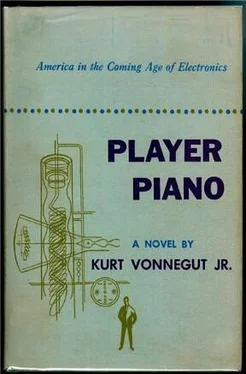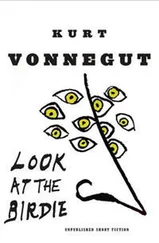"He said I was about to quit?"
"No. He said you were a quitter." She sighed heavily. "He knows you better than I do, apparently."
"God knows it'd be easy enough to stick with the system, and keep going right on up. It's getting out that takes nerve."
"But why quit, if it's so easy to stick with it?"
"Didn't you hear anything I said in Homestead? That's why I took you there, so you'd get the feel of things."
"That silly business about Katharine Finch and Shepherd?"
"No, no - God no. About how people like us have taken all the self-respect from all the others."
"You said you felt like a horse's ass. I remember that."
"Don't you, sometimes?"
"What an idea!"
"Your conscience, dammit - doesn't it ever bother you?"
"Why should it? I've never done anything dishonest."
"Let me put it another way: do you agree things are a mess?"
"Between us?"
"Everywhere! The world!" She could be appallingly nearsighted. Whenever possible, she liked to reduce any generalization to terms of herself and persons she knew intimately. "Homestead, for instance."
"What else could we possibly give the people that they haven't got?"
"There! You made my point for me. You said, what else could we give them , as though everything in the world were ours to give or withhold."
"Somebody's got to take responsibility, and that's just the way it is when somebody does."
"That's just it: things haven't always been that way. It's new, and it's people like us who've brought it about. Hell, everybody used to have some personal skill or willingness to work or something he could trade for what he wanted. Now that the machines have taken over, it's quite somebody who has anything to offer. All most people can do is hope to be given something."
"If someone has brains," said Anita firmly, "he can still get to the top. That's the American way, Paul, and it hasn't changed." She looked at him appraisingly. "Brains and nerve, Paul."
"And blinders." The punch was gone from his voice, and he felt drugged, a drowsiness from a little too much to drink, from scrambling over a series of emotional peaks and pits, from utter frustration.
Anita caught the strap of his overalls and pulled him down to kiss him. Paul yielded stiffly.
"Ohhhhhhh," she chided, "you're such a little boy sometimes." She pulled him down again, this time making sure he kissed her on the lips. "You stop worrying, now, you hear?" she whispered in his ear.
"Descent into the Maelstrom," he thought wearily, and closed his eyes, and gave himself over to the one sequence of events that had never failed to provide a beginning, a middle, and a satisfactory end.
"I love you, Paul," she murmured. "I don't want my little boy to worry. You're not going to quit, sweetheart. You're just awfully tired."
"Mmmm."
"Promise not to think any more about it?"
"Mmmm."
"And, we are going to Pittsburgh, aren't we?"
"Mmmm."
"And what team is going to win at the Meadows?"
"Mmmm."
"Paul -"
"Hmmm?"
"What team is going to win?"
"Blue," he whispered sleepily. "Blue, by God, Blue."
"That's my boy. Your father would be awfully proud."
"Yup."
He carried her across the wide-board floor into the pine-wainscoted bedroom and laid her down on a patchwork quilt on a bird's-eye maple bed. There, Mr. Haycox had told him, six independent people had died, and fourteen had been born.
DOCTOR PAUL PROTEUS, for want of a blow severe enough to knock him off the course dictated by the circumstances of his birth and training, arrived uneventfully at the day when it was time for men whose development was not yet complete to go to the Meadows.
The crisis was coming, he knew, when he would have to quit or turn informer, but its approach was unreal, and, lacking a decisive plan for meeting it, he forced a false tranquillity on himself - a vague notion that everything would come out all right in the end, the way it always had for him.
The big passenger plane, after an hour in the air, circled over the shore, where the pine forest met the waters at the source of the St. Lawrence. The plane dropped lower, and the landing strip in the forest could be seen, and then the cluster of log lodges and dining hall and shuffleboard courts and tennis courts and badminton courts and softball diamonds and swings and slides and bingo pavilion of the Mainland, the camp for women and children. And jutting into the river was a long dock and three white yachts, the port of embarkation for men going to the island called the Meadows.
"I guess this is just about goodbye," said Paul to Anita, as the plane came to a stop.
"You look wonderful," said Anita, straightening his blue captain's shirt for him. "And what team is going to win?"
"Blue," said Paul. "Gott mit uns."
"Now, I'm going to be working on Mom here, while -"
"Ladies over here!" boomed the public address system. "Men will assemble over on the dock. Leave your luggage where it is. It will be in your cabins when you arrive."
"Goodbye, darling," said Anita.
"Goodbye, Anita."
"I love you, Paul."
"I love you , Anita."
"Come on," said Shepherd, who had arrived on the same plane. "Let's get going. I'm anxious to see just how hot this Blue Team is."
"Blue Team, eh?" said Baer. "Worried about the Blue Team, are you, eh? Eh? White. White's the one to look out for, boy." He stretched out his white shirt for them to admire. "See? See? That's the shirt to look out for. See? Aha, aha -"
"Where's Doctor Kroner?" said Shepherd.
"Went up yesterday," said Paul. "He's among the official greeters, so he's already on the island." He waved once more to Anita, who was going down a gravel path toward the Mainland's buildings with a dozen other women, Katharine Finch and Mom Kroner among them, and a handful of children. All day, planes would be bringing more.
Anita sidled up to Mom and took her fat arm.
Concealed loudspeakers in the virgin forest burst into song:
"To you, beautiful lady, I raise my eyes;
My heart, beautiful lady, to your heart sighs.
Come, come, beautiful lady, to Paradise . . ."
The song died in a clatter in the loudspeaker, a cough, and then a command: "Men with classification numbers from zero to one hundred will please board the Queen of the Meadows ; those with numbers from one hundred to two hundred and fifty will board the Meadow Lark ; those with numbers above two hundred and fifty will get on the Spirit of the Meadows ."
Paul, Shepherd, Baer, and the rest of the contingent from the Albany-Troy-Schenectady-Ilium area walked out onto the dock where earlier arrivals were waiting. All put on dark glasses, which they would wear during the next two weeks to protect their eyes from the unrelenting glare of the summer sun on the river, and on the whitewashed buildings, white gravel paths, white beach, and white cement courts of the Meadows.
"Green's going to win!" shouted Shepherd.
"You tell 'em, Cap!"
Everyone shouted and sang, the marine engines burbled and roared, and the three yachts shot toward the island in V-formation.
Squinting through spray, Paul watched the Meadows come closer and closer, hot, bleached, and sanitary. The white serpent stretching the island's length could now be seen as a row of white cubes, the insulated cement-block structures called, in Meadows parlance dating back to more primitive facilities, tents. The amphitheater on the island's northernmost tip looked like a dinner plate, and the sports area around it was a geometric patchwork of every imaginable kind of court. Whitewashed rocks everywhere framed the paths and gar -
Читать дальше








![Курт Воннегут - Вампитеры, фома и гранфаллоны [litres]](/books/397997/kurt-vonnegut-vampitery-foma-i-granfallony-litre-thumb.webp)